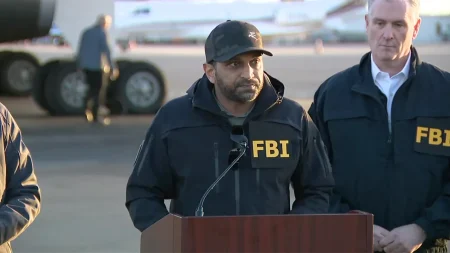Palestinian Authority President Abbas Addresses UN, Expresses Gratitude for Growing Statehood Recognition
Abbas Highlights Diplomatic Momentum as More Nations Recognize Palestinian State
In a significant address to the United Nations General Assembly on Thursday, Palestinian Authority President Mahmoud Abbas expressed profound gratitude to the growing number of nations that have formally recognized Palestinian statehood. Speaking via video conference to the assembled global leaders, Abbas emphasized the importance of this diplomatic momentum in what has become an increasingly challenging geopolitical landscape for Palestinians.
“Today, I stand before this esteemed assembly with heartfelt appreciation for those countries that have taken the courageous and principled step of recognizing the State of Palestine,” Abbas stated in his measured yet emotional address. “These nations have demonstrated their commitment to international law, human rights, and the long-overdue right of the Palestinian people to self-determination.” The Palestinian leader’s remarks come at a time when the recognition of Palestinian statehood has gained renewed attention on the international stage, with several European and Global South nations recently joining the more than 140 countries that have formally acknowledged Palestine as a sovereign state.
Abbas’s address carefully contextualized these diplomatic developments within the broader historical struggle for Palestinian sovereignty. He outlined the decades-long pursuit of a two-state solution, emphasizing that international recognition represents a crucial step toward making this long-standing goal a tangible reality. “Recognition is not merely symbolic,” Abbas insisted. “It constitutes a concrete affirmation of the Palestinian people’s inherent right to determine their own future and live with dignity in their homeland.” Throughout his speech, the Palestinian president connected the issue of statehood recognition to broader principles of international justice, human rights, and the established framework of UN resolutions that have consistently supported Palestinian self-determination.
Diplomatic Recognition Gains Momentum Amid Regional Tensions
The timing of Abbas’s expression of gratitude holds particular significance against the backdrop of complex regional dynamics and ongoing challenges to the peace process. Recent diplomatic breakthroughs have included several European nations formally recognizing Palestine, a development that Abbas characterized as “a beacon of hope in difficult times.” Notably, his address acknowledged both longstanding supporters and newer allies, highlighting the diverse global coalition that now formally recognizes Palestinian statehood.
“From our steadfast friends who recognized Palestine decades ago to those who have recently joined this honorable position, we extend our deepest appreciation,” Abbas remarked. “Each recognition strengthens not only Palestine’s position on the international stage but also reinforces the very foundation of a rules-based international order.” The Palestinian Authority president specifically highlighted recent recognitions from several European countries, which have traditionally aligned their positions with broader European Union policy. These diplomatic shifts suggest a potential evolution in the international community’s approach to Palestinian statehood, with implications that extend beyond symbolic recognition to questions of practical sovereignty.
Political analysts observing the speech noted that Abbas’s focus on diplomatic recognition reflects a strategic emphasis on international legitimacy at a time when direct negotiations have stalled. Dr. Sarah Mahmoud, Middle East policy expert at the International Crisis Group, explained: “By highlighting growing international recognition, Abbas is leveraging diplomatic momentum to strengthen Palestine’s position. This approach reflects the PA’s current strategy of pursuing international legitimacy while direct peace talks remain deadlocked.” This diplomatic strategy has taken on renewed importance as Palestinians navigate a complex political landscape, with recognition serving as both a political tool and an affirmation of national aspirations.
Recognition as a Pathway to Sustainable Peace and Security
In one of the more nuanced portions of his address, Abbas framed recognition of Palestinian statehood not as an obstacle to peace but as an essential prerequisite for meaningful negotiations and lasting regional stability. He directly addressed concerns that unilateral recognition might undermine the peace process, arguing instead that formal acknowledgment of Palestinian rights establishes the necessary foundation for good-faith negotiations.
“Recognition of Palestine does not preclude negotiations—it creates the conditions where genuine negotiations between equals can finally occur,” Abbas emphasized. “The international community’s acknowledgment of our statehood establishes the foundation upon which a just and lasting peace can be constructed.” This perspective challenges the notion that recognition should be conditional on the outcome of negotiations, instead positioning it as a necessary starting point for meaningful dialogue. Abbas specifically highlighted how recognition helps balance the asymmetrical power dynamic that has historically characterized Israeli-Palestinian negotiations.
The Palestinian leader’s address also connected statehood recognition to broader regional security interests, suggesting that acknowledging Palestinian sovereignty contributes to regional stability rather than undermining it. “A recognized State of Palestine, living side by side with Israel in peace and security, remains the only viable path toward lasting stability in our region,” Abbas stated. This framing attempts to align Palestinian national aspirations with the international community’s interest in regional peace, presenting recognition as a practical step toward achieving both Palestinian rights and broader security objectives.
International Law and Human Rights Underpin Recognition Movement
Throughout his address, Abbas grounded his discussion of statehood recognition in established principles of international law and human rights. This legal framing served to position recognition not as a political preference but as the fulfillment of legal obligations under the UN Charter and numerous Security Council resolutions. The Palestinian leader methodically outlined the legal basis for Palestinian statehood, citing foundational documents and principles that have guided the international community’s approach to territorial sovereignty and self-determination.
“Recognition of Palestine represents the implementation of international law, not its circumvention,” Abbas stated firmly. “It aligns with the fundamental principle of self-determination enshrined in the UN Charter and reaffirmed in countless resolutions specific to the Palestinian question.” By emphasizing this legal framework, Abbas sought to characterize recognition as the fulfillment of existing international commitments rather than a novel or controversial position. This approach resonates particularly strongly with nations that prioritize international legal frameworks in their foreign policy decisions.
Ambassador Jean-Paul Renaud, former UN Special Rapporteur on human rights in the Palestinian territories, noted: “Abbas’s emphasis on international law reflects a significant shift in Palestinian strategy—moving the conversation from political preferences to legal obligations. This framework makes it increasingly difficult for countries to justify non-recognition.” This legal dimension of Abbas’s gratitude highlighted how the recognition movement has evolved from primarily symbolic gestures to concrete implementations of established legal principles regarding self-determination and territorial sovereignty.
Looking Forward: Recognition as Foundation for Future Peace Efforts
In the concluding portion of his address, President Abbas looked toward the future, outlining how recognition of Palestinian statehood could serve as a foundation for renewed peace efforts rather than an endpoint in itself. He articulated a vision where growing international recognition creates momentum for comprehensive negotiations addressing all final status issues, including borders, Jerusalem, refugees, and security arrangements.
“As we express our gratitude for recognition, we simultaneously reaffirm our unwavering commitment to achieving a comprehensive peace through negotiations that address all outstanding issues,” Abbas stated. “Recognition strengthens our capacity to engage as equals in such discussions, ensuring that the resulting agreements reflect the legitimate rights and aspirations of both peoples.” This forward-looking perspective sought to counter criticism that pursuing recognition might undermine direct negotiations, instead positioning it as a necessary step toward more productive peace efforts.
The Palestinian leader concluded his address with a direct appeal to nations that have not yet recognized Palestinian statehood, framing such recognition as an investment in regional stability and international justice. “To those nations still considering their position on Palestinian statehood, we extend an invitation to join the growing international consensus,” Abbas said. “Recognition represents not only support for Palestinian rights but also a commitment to the universal principles that bind our global community.” This appeal emphasized both moral principles and practical considerations, presenting recognition as aligned with both values-based foreign policy and strategic interests in Middle East stability.
As President Abbas concluded his address to the United Nations General Assembly, his expression of gratitude for statehood recognition reflected both diplomatic courtesy and strategic positioning. By highlighting and thanking supporters, Abbas effectively showcased the growing international legitimacy of Palestinian statehood claims while encouraging additional nations to join this expanding consensus. In a diplomatic landscape often characterized by intractable positions, his focus on gratitude and recognition offered a rare moment of acknowledgment for incremental progress toward the long-sought goal of Palestinian statehood.








